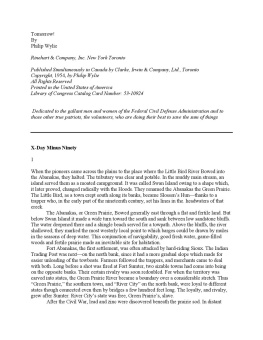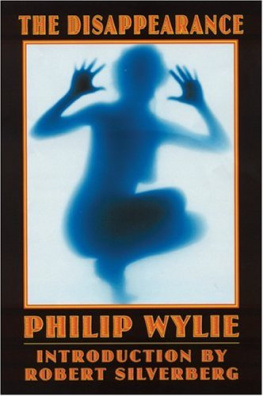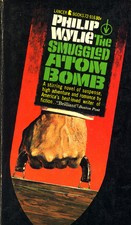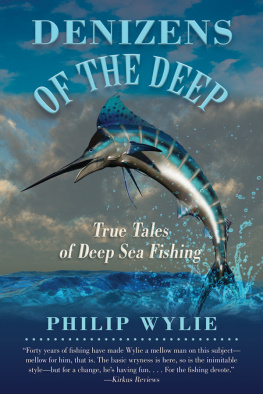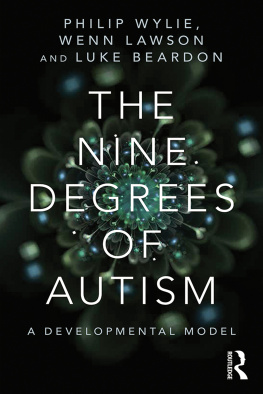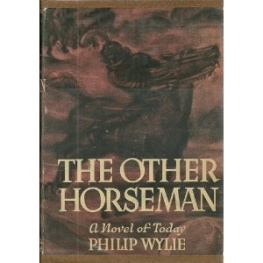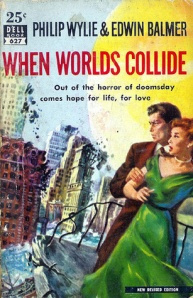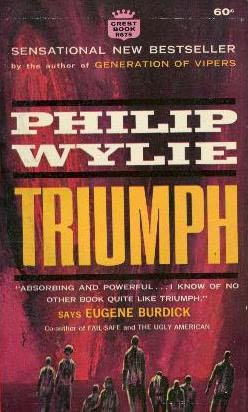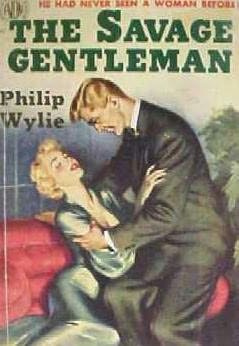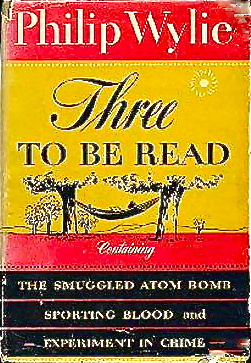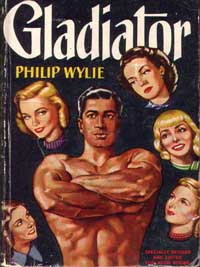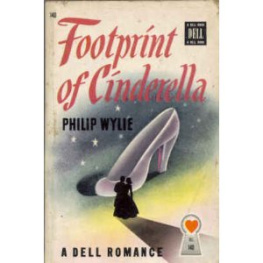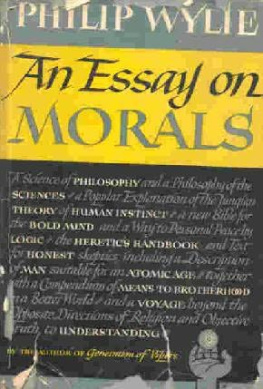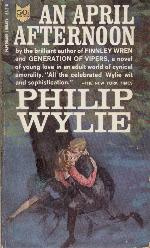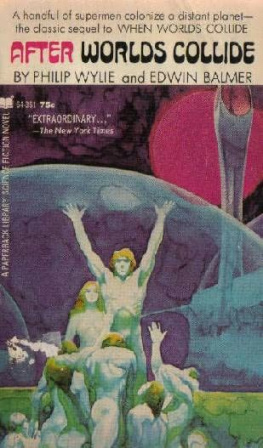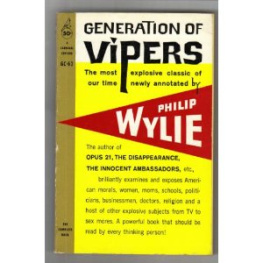Philip Wylie - Tomorrow!
Here you can read online Philip Wylie - Tomorrow! full text of the book (entire story) in english for free. Download pdf and epub, get meaning, cover and reviews about this ebook. genre: Detective and thriller. Description of the work, (preface) as well as reviews are available. Best literature library LitArk.com created for fans of good reading and offers a wide selection of genres:
Romance novel
Science fiction
Adventure
Detective
Science
History
Home and family
Prose
Art
Politics
Computer
Non-fiction
Religion
Business
Children
Humor
Choose a favorite category and find really read worthwhile books. Enjoy immersion in the world of imagination, feel the emotions of the characters or learn something new for yourself, make an fascinating discovery.
- Book:Tomorrow!
- Author:
- Genre:
- Rating:5 / 5
- Favourites:Add to favourites
- Your mark:
- 100
- 1
- 2
- 3
- 4
- 5
Tomorrow!: summary, description and annotation
We offer to read an annotation, description, summary or preface (depends on what the author of the book "Tomorrow!" wrote himself). If you haven't found the necessary information about the book — write in the comments, we will try to find it.
Tomorrow! — read online for free the complete book (whole text) full work
Below is the text of the book, divided by pages. System saving the place of the last page read, allows you to conveniently read the book "Tomorrow!" online for free, without having to search again every time where you left off. Put a bookmark, and you can go to the page where you finished reading at any time.
Font size:
Interval:
Bookmark:
Tomorrow!
By
Philip Wylie
Rinehart & Company, Inc. New York TorontoPublished Simultaneously in Canada by Clarke, Irwin & Company, Ltd., TorontoCopyright, 1954, by Philip Wylie
All Rights Reserved
Printed in the United States of America
Library of Congress Catalog Card Number: 53-10924
Dedicated to the gallant men and women of the Federal Civil Defense Administration and tothose other true patriots, the volunteers, who are doing their best to save the sum of thingsX-Day Minus Ninety
When the pioneers came across the plains to the place where the Little Bird River Bowed into the Abanakas, they halted. The tributary was clear and potable. In the muddy main stream, an island served them as a moated campground. It was called Swan Island owing to a shape which, it later proved, changed radically with the Hoods. They renamed the Abanakas the Green Prairie.
The Little Bird, as a town crept south along its banks, became Slossens Hunthanks to a trapper who, in the early part of the nineteenth century, set his lines in the. headwaters of that creek.
The Abanakas, or Green Prairie, Bowed generally east through a flat and fertile land. But below Swan Island it made a wide turn toward the south and sank between low sandstone bluffs.
The water deepened there and a shingle beach served for a towpath. Above the bluffs, the river shallowed; they marked the most westerly local point to which barges could be drawn by mules in the seasons of deep water. This conjunction of navigability, good fresh water, game-filled woods and fertile prairie made an inevitable site for habitation.
Fort Abanakas, the first settlement, was often attacked by hard-riding Sioux. The Indian Trading Post was nexton the north bank, since it had a more gradual slope which made for easier unloading of the towboats. Farmers followed the trappers, and merchants came to deal with both. Long before a shot was fired at Fort Sumter, two sizable towns had come into being on the opposite banks. Their certain rivalry was soon redoubled. For when the territory was carved into states, the Green Prairie River became a boundary over a considerable stretch. Thus
Green Prairie, the southern town, and River City on the north bank, were loyal to different states though connected even then by bridges a few hundred feet long. The loyalty, and rivalry, grew after Sumter: River Citys state was free, Green Prairies, slave.
After the Civil War, lead and zinc were discovered beneath the prairie sod. In distant hills, at the centurys turn, a dam heaped up the rivers energy. Hydroelectric plants followed.
Oil was found in Bugle County and good coking coal in Tead. Smoke covered the prairies from then on. And the immigrants arrived.
They unpacked their carpetbags. They sold skills learned in the mills and mines of Europe. They created lichenlike slums, went to school, entered politics, became the gangsters of the twenties and some, the heroes of the Second World War.
By then the combined population of River City and Green Prairie approached a million.
Where the sullen, sweating mules had brought the barges to rest, where Sioux arrows had fired cottonwood logs in the fort, skyscrapers stood.
By then, there were families who could look back to four or five generations of unbroken residence in the region. Some of these natives were rich and powerful; some were poor; but most were ordinary peopleprospering modestly, loving freedom, hating interference, intelligent by the lights of their society, fair citizens and superb neighbors. The Conner family in Green Prairie was such.
Their white frame house had been built in 1910, set back in a big lawn on Walnut Street in the residential south section, then a long trolley ride from the busy downtown district. The houses around were like the Conner house in atmosphere even though some were frame, some brick and some stucco. The people, too, were like the Conners: indistinguishable from millions in the nation, at first glanceyet, like the millions, on any second look more individualist than most other people of the earth. At the end of the Second War, during the great expansion, the Conners had thrived. But like all their fellow citizens, and more keenly than many, they shared the doubts and anxieties of the new age.
Its very voice influenced their lives, even their domestic lives, as the years chased each other swiftly, rewardingly, after the centurys mid-point. Green Prairie and River City were halves of a happy, urban world, separated by a river and a political boundary but united by bridges both actual and spiritual. Typically American, content, constructive, the Conners, too, were happy. And yet....
The sound came through the open windows of the dining room. Each of the five members of the Conner family was differently affected. Henry, the father, stopped all movement to listen.
The gravy spoon, which he had been about to plunge into his mashed potatoes, dripped midway between the bowl and his plate. His wife, Beth, looked out through the screened windows, frowning, as if she wished she had never heard a siren in her life.
Nora, who was eleven, exclaimed, Brother! You can hear it this time, all right, all right!
Ted Conner pushed back his chair, stood, started to go, and snatched a fresh roll, already buttered and spread with homemade jam, before his feet took the stairs with the noisy incoherence of a male high school student in a hurry.
Charles, the older son, smiled faintly. This was the first evening of his leave and the first time hed worn home the proud silver bar of a first lieutenant. The dinnerespecially the roast beef which had filled the kitchen with a hungerbegetting aroma all afternoonwas a celebration for him. Now the sound surging over the city would interfere with that homely ceremony. Charless smile expressed his regret. Can I help? he asked his father, who had risen.
Guess not. This is a civilian party! Henry Conner took the stairs in the wake of his younger son, but more deliberately.
Its a shame it had to be this evening, Mrs. Conner said. Still, Nora and you and I can at least eat.
Arent you in it? Charles asked.
Im in the First Aid Group, yes. But we dont have to answer this call.
Nora, always ready to amplify any subject, her mobile mouth apparently unembarrassed by potatoes, said informatively, This is just for air-raid-warden practice, and the rescue teams, and cops and firemen, and like that.
Nora! Dont talk with your mouth full. And dont say, and like that! Its bad grammar.
Charles Conner, Lieutenant Conner, laughed a little.
It was good to be home, good to listen to the gentle reprimands that spelled home and were nothing like military correction. After dinner he would get out of uniform, enjoy the comfort of slacks and a sports coat. He would go next door and see if Lenore Bailey would like to take in a movie.
The siren gathered strength and volume. Its initial growl and its first crescendo had seemed far away; soon its slow rise and fall became pervasive and penetrating; when it slurred into each high warble, the human head was invaded not just by noise, but by what seemed a tangible substance. Nora reflected the fact. This new one, she yelled above it, sure is a lulu!
They must have hung it on a tree in our back yard, Charles replied loudly.
His mother shook her head. Its on the new TV tower, out on Sunset Parkway by the reservoir.
Henry Conner came down the stairs two at a time. Where the hell are my car keys, Beth?
Right on your dresser.
I looked there!
Behind Charless photograph.
Oh! He bounded up the stairs, hurried back, opened the front door and yelled from the porch, Ted, that moron, has left his jalopy in the drive! How many times do I have to... ?
Next pageFont size:
Interval:
Bookmark:
Similar books «Tomorrow!»
Look at similar books to Tomorrow!. We have selected literature similar in name and meaning in the hope of providing readers with more options to find new, interesting, not yet read works.
Discussion, reviews of the book Tomorrow! and just readers' own opinions. Leave your comments, write what you think about the work, its meaning or the main characters. Specify what exactly you liked and what you didn't like, and why you think so.

